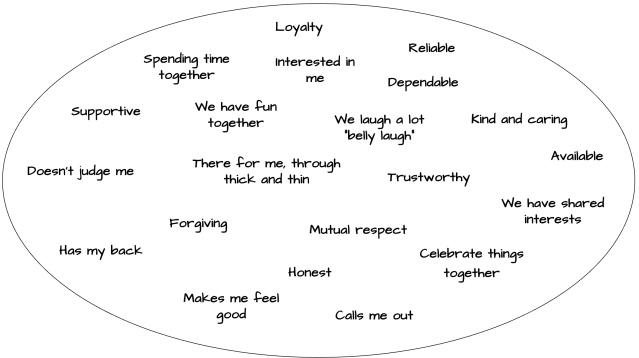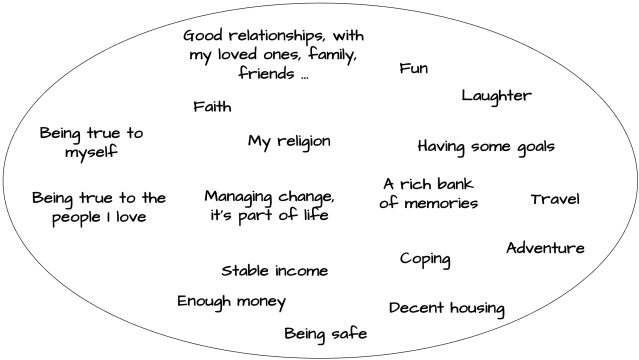Mindfulness
Three Keys to Mindfulness: Awareness, Attitude, and Values
What does a life well lived look like? It begins here.
Posted July 19, 2024 Reviewed by Tyler Woods
Key points
- Mindfulness offers three keys that can help people unlock a life well lived.
- Mindfulness is about the mind being and becoming a best friend.
- Wherever someone is, whatever they’re doing, their values point them in the right direction, like a compass.
Hiking in the Lake District of England, I stopped for lunch in a cemetery. There was a headstone with a name and this simple inscription: “A Life Well Lived.” What does a life well lived look like? It’s a question that we’ve all asked in one form or another.
Perhaps you’re interested in living your life well, or you have a nagging feeling that your life isn’t quite as you’d imagined, or maybe you appreciate that you have a good life and you’d like to keep it that way—or even build on these foundations, because who knows what the years ahead may bring? What does mindfulness have to do with this?
Mindfulness: Three Keys to Living Well
Perhaps you’ve been intrigued by mindfulness or taken a course or practiced mindfulness for a while, but let it lapse, as so many of us do. Now is the time to try it. Mindfulness offers three keys that can help you unlock a life well lived.
1. Befriending Your Mind
“My mind can be my worst enemy or best friend," said Raheem Sterling, a young English soccer player. Sterling is known for inspiring others through his work ethic, for his family values, and for raising awareness of important social issues. He meditates because it helps him befriend his mind, which in turn helps him with his sport, mental health, and wider work.
In order to befriend your mind, first ask yourself: What does friendship mean to you? What words or phrases best describe your friendships? What does a good friend do for you—now and over the years—through the good and the bad patches of your life?
I’ve posed these questions to hundreds of people in workshops around the world, and here is what people say most often.

“Mindfulness is about our mind being and becoming our best friend.”
Does your idea of a good friend describe how you feel about your own mind? Maybe you already talk to yourself in affirming ways, with messages like “You’ve got this,” “Steady,” “Take a breath,” and “I’ve got your back; it will be OK.” Or maybe the voice you use with yourself is critical—“I can’t do that”—or demanding—“I don’t have time.”
If you already have a sense of your mind as a friend, you can always develop that friendship further. You can choose to befriend your mind, so it becomes as practiced and natural as putting on your shoes before you go out. If you don’t feel like your mind is your friend, it is possible to befriend your mind so it accompanies you in whatever challenges your life throws up.
2. Using Your Values as Your Compass
Certain ideas and values have become mainstream:
- I measure myself by how much I get done and what I'm bringing in, whether on a personal level or for the greater good, sort of like my "gross domestic product.”
- I put myself first because it is a dog-eat-dog world.
- I've got to always be on point—you know, look amazing, stay youthful, stay in shape, be attractive, and show that I'm making it in life.
- If I let my guard down, I’ll get taken advantage of.
- Busyness is good.
- Being tough is good; being kind is soft.
- Being in the spotlight gives my life meaning. I'm this close to striking it rich if only I could score the perfect job, hit that jackpot, blow up as an influencer, or just start hanging with the right crowd.
From an early age, we feel pressure to have an opinion about who we are, other people, what we like and don’t like, our favorite this or that, and what we want to do when we grow up. We may claim certain “values” just to avoid uncertainty or to avoid feeling ashamed of not knowing what our values are. With all the pressure on us to do well, be better, achieve, prove we deserve our place in the world, or look a certain way, we may simply adopt prevalent ideas without question. When we do, we may end up pursuing someone else’s vision for our life.
Of course, productivity is necessary, but few people at the end of their lives look back and say, “I had a good life because I was productive and successful in this dog-eat-dog, getting-ahead world.” And if they do, did it make them and the people around them happy?
Ask yourself right now what makes you happy. What or whom do you care most about? What are you passionate about? No need to overthink—just note what comes up, then let it go and see what else comes up. And don’t worry if not much arises; that’s fine, too.
Your answers to these questions of what matters most point to your values. We’re all different, and an important part of living well is knowing what’s meaningful to us.
Here are some of the values that people often mention.

Wherever you are, whatever you’re doing, your values, like a compass, point you in the right direction.
Values are at the root of mindfulness; they guide how we are in the world and what we say and do. And just as important, they guide what we don’t say or do. If family is a foundational value, this shapes choices and even lives. Faith provides a set of values that can provide a sense of belonging and meaning.
Everyone’s story involves learning a set of values. My father has a strong work and family ethic, developed in very difficult circumstances when he found himself the “man of the family” as a young boy interned in a concentration camp with his mother, younger sisters, and brother. Throughout his life he provided selflessly for his family through hard work. I know he regarded the savings he left behind to provide for my mother and my sisters and me a key part of his life work.
Together, these three keys of mindfulness bring to life how your values can be your sense of direction, your compass, and the route map on your phone. Your role is to explore your values and how they can guide you. To embrace your values and be courageous enough to value what is truly important.
The landscape of our lives, our families, our schools, our workplaces, our community, and the planet is created by human minds and hearts. It can be tempting to retreat to routine, to where we feel safe, to what we know. But try asking, “Is this enlarging and in line with my values or reassuring but ultimately diminishing?”
Enlarge your mind, your relationships, your life, and your sense of what is possible in the world. Seek out what enlarges you, whatever that is. It may be people in your life, sports, art, a favorite phrase, or an idea. Who and what enlarges you? Can they be what protects you, vitalizes you, and gives you a sense of purpose?
3. Waking Up and Paying Attention
There are a lot of pulls on our attention, and this can give us a sense of being fragmented. With all the demands on us, it’s easy to react by checking out and sleepwalking through life. Zoning out can be comfortable, but there are many good reasons to live with a sense of being fully awake.
Leading the life we want means waking up and paying attention.
Attention is one of your most important resources. What you focus on shapes what you think, your decisions, what you feel, and, ultimately, your reality. It's like the spotlight that illuminates certain conversations, people, successes, problems, and feelings while leaving others in the shadows.
How much of today have you been awake? I don’t mean awake literally; I mean awake in the sense of feeling alive. Twenty-five percent, 50 percent, most of the day?
Practical Steps to Begin
Every moment is already here, waiting for you to pay attention to it. In a sense, you don’t need to do anything differently. It is more of an adjustment in how you approach your day, choosing to pay attention on purpose, with attitudes of curiosity and friendliness.
1. Start Small: Begin with simple mindfulness practices like mindful breathing or a body scan.
2. Reflect Daily: Take a few moments each day to reflect on your attitude and values.
3. Stay Consistent: Regular practice is key to developing and sustaining mindfulness.
This post was excerpted from Willem Kuyken's Mindfulness for Life (Guilford Press, 2024).
References
Extract from
Willem Kuyken (2024) Mindfulness for Life. Guilford Press.




